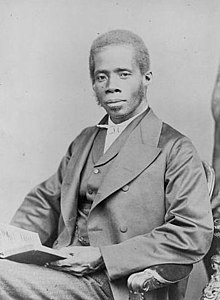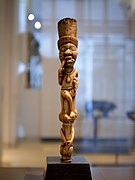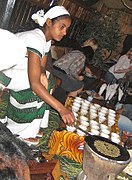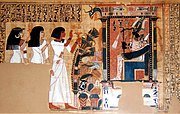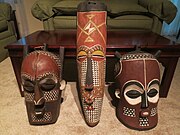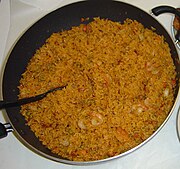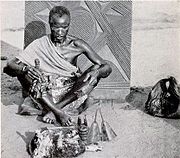IntroductionWelcome to the Pan-Africanism portal!
Bienvenue sur le portail panafricanisme!   Pan-Africanism is a worldwide movement that aims to encourage and strengthen bonds of solidarity between all indigenous peoples and diasporas of African ancestry. Based on a common goal dating back to the Atlantic slave trade, the movement extends beyond continental Africans with a substantial support base among the African diaspora in the Americas and Europe. Pan-Africanism can be said to have its origins in the struggles of the African people against enslavement and colonization and this struggle may be traced back to the first resistance on slave ships—rebellions and suicides—through the constant plantation and colonial uprisings and the "Back to Africa" movements of the 19th century. Based on the belief that unity is vital to economic, social, and political progress, it aims to "unify and uplift" people of African ancestry. (Full article...) Selected articleThe Black Panther Party (BPP), originally the Black Panther Party for Self-Defense, was a political organization founded by Bobby Seale and Huey Newton in October 1966. The party was active in the United States from 1966 until 1982, with international chapters operating in the United Kingdom in the early 1970s, and in Algeria from 1969 until 1972. At its inception on October 15, 1966, the Black Panther Party's core practice was its armed citizens' patrols to monitor the behavior of officers of the Oakland Police Department and challenge police brutality in Oakland, California. In 1969, community social programs became a core activity of party members. The Black Panther Party instituted a variety of community social programs, most extensively the Free Breakfast for Children Programs, and community health clinics to address issues like food injustice. The party enrolled the most members and made the greatest impact in the Oakland-San Francisco Bay Area, New York, Chicago, Los Angeles, Seattle, and Philadelphia. Selected biography
Edward Wilmot Blyden (3 August 1832 – 7 February 1912) was an educator, writer, diplomat, and politician primarily in Liberia. Born in the West Indies, he joined the free black immigrants from the United States who migrated to the region. He taught for five years in the British West African Colony of Sierra Leone in the early 20th century. His writings on pan-Africanism were influential in both colonies. These were founded during the slavery years for the resettlement of free blacks from Great Britain and the United States. Blyden's writings attracted attention in the sponsoring countries as well. He believed that Zionism was a model for what he called Ethiopianism, and that African Americans could return to Africa and redeem it. He believed political independence to be a prerequisite for economic independence, and argued that Africans must counter the neo-colonial policies of former colonial powers. Selected history The First Pan-African Conference was held in London from 23 to 25 July 1900 (just prior to the Paris Exhibition of 1900 "in order to allow tourists of African descent to attend both events"). Organized primarily by the Trinidadian barrister Henry Sylvester Williams, it took place in Westminster Town Hall (now Caxton Hall) and was attended by 37 delegates and about 10 other participants and observers from Africa, the West Indies, the US and the UK, including Samuel Coleridge Taylor (the youngest delegate), John Alcindor, Dadabhai Naoroji, John Archer, Henry Francis Downing, and W. E. B. Du Bois, with Bishop Alexander Walters of the AME Zion Church taking the chair. Du Bois played a leading role, drafting a letter ("Address to the Nations of the World") to European leaders appealing to them to struggle against racism, to grant colonies in Africa and the West Indies the right to self-government and demanding political and other rights for African Americans. Selected cultureThe culture of Africa is varied and manifold, consisting of a mixture of countries with various tribes that each have their own unique characteristic from the continent of Africa. It is a product of the diverse populations that today inhabit the continent of Africa and the African Diaspora. African culture is expressed in its arts and crafts, folklore and religion, clothing, cuisine, music and languages. Expressions of culture are abundant within Africa, with large amounts of cultural diversity being found not only across different countries but also within single countries. Even though African cultures are widely diverse, it is also, when closely studied, seen to have many similarities. For example, the morals they uphold, their love and respect for their culture as well as the strong respect they hold for the aged and the important i.e. Kings and Chiefs. Africa has influenced and been influenced by other continents. This can be portrayed in the willingness to adapt to the ever-changing modern world rather than staying rooted to their static culture. The Westernized few, persuaded by European culture and Christianity, first denied African traditional culture, but with the increase of African nationalism, a cultural recovery occurred. The governments of most African nations encourage national dance and music groups, museums, and to a lower degree, artists and writers. Selection of images depicting African culture
Selected imagesOrganisationsAll-African People's Revolutionary Party · African Society for Cultural Relations with Independent Africa · African Unification Front · African Union · African Queens and Women Cultural Leaders Network · Conseil de l'Entente · Convention People's Party · East African Community · Economic Freedom Fighters · Global Afrikan Congress · International African Service Bureau · International League for Darker People · Organisation of African Unity · Pan African Association · Pan-African Congress · Pan Africanist Congress of Azania · Rassemblement Démocratique Africain · Pan Africa Chemistry Network · Pan African Federation of Accountants · Pan-African Freedom Movement for East and Central Africa · Sahara and Sahel Observatory · UNIA-ACL · ZANU–PF
See also
& Festivals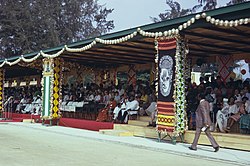 Photo by Helinä Rautavaara (1977) Publications
Films and TVAudios and videosDid you know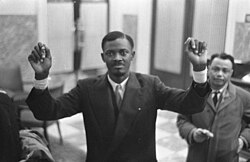 ...that during the tumultuous Year of Africa, seventeen countries gained independence, South Africans began armed resistance to apartheid, and Patrice Lumumba (pictured) gained and lost his freedom?
Selected quotesIn addressing imperialism at a Salisbury (Southern Rhodesia) meeting held on 9 April 1962, the former President of Zimbabwe Robert Mugabe delivered the following speech:
Pan-Africanism topicsCategoriesThings you can do
Related portalsAssociated WikimediaThe following Wikimedia Foundation sister projects provide more on this subject:
Discover Wikipedia using portals | |||||||||||||||||||||||||||||||
